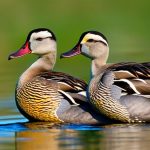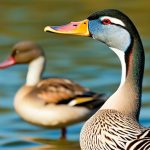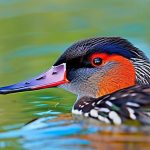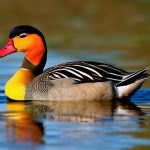Duck egg breeds have a long history dating back thousands of years. Ducks were domesticated in Asia and have been raised for their eggs and meat ever since. Today, there are many different types of ducks, each with its own unique characteristics and qualities.
Some of the most common duck egg breeds include Pekin ducks, Muscovy ducks, Khaki Campbell ducks, and Runner ducks. Pekin ducks are known for their large size and white feathers. They are a popular choice for commercial egg production due to their high egg-laying capacity. Muscovy ducks, on the other hand, are known for their lean meat and unique appearance. They have a distinct red face and are often raised for both eggs and meat.
Khaki Campbell ducks are a popular choice for backyard flocks due to their excellent egg-laying abilities. They are known for their high egg production and can lay up to 300 eggs per year. Runner ducks, as the name suggests, have an upright posture and are known for their ability to run rather than waddle like other duck breeds. They are also good layers and can produce around 200 eggs per year.
Key Takeaways
- There are different types of duck egg breeds, each with unique characteristics and traits.
- Raising duck egg breeds can provide nutritional benefits and contribute to sustainable agriculture practices.
- Some of the most commonly raised duck egg breeds include the Pekin, Muscovy, and Khaki Campbell.
- There are also rare duck egg breeds, such as the Silver Appleyard and Ancona, that are worth exploring.
- When choosing a duck egg breed for your farm, consider factors such as climate, space, and egg production.
The Benefits of Raising Duck Egg Breeds: Nutritional Value and Sustainability
Duck eggs offer several nutritional benefits compared to chicken eggs. They are larger in size and have a higher yolk-to-white ratio, making them richer in flavor and nutrients. Duck eggs contain more protein, vitamins, and minerals than chicken eggs. They also have a higher fat content, which gives them a creamier texture when cooked.
In addition to their nutritional value, raising duck egg breeds is also more sustainable compared to other livestock. Ducks require less space than chickens or cows and can be raised in smaller areas. They also have a lower impact on the environment as they produce less waste and require less feed. Ducks are also excellent foragers and can help control pests in the garden, reducing the need for chemical pesticides.
Popular Duck Egg Breeds: A Comprehensive Guide to the Most Commonly Raised Ducks
Pekin ducks are one of the most popular duck egg breeds due to their high egg-laying capacity and large size. They are known for their white feathers and orange bills. Pekin ducks are docile and easy to handle, making them a good choice for beginners. They are also good meat birds and have a tender and flavorful meat.
Muscovy ducks are another popular choice for both eggs and meat. They have a unique appearance with their red face and caruncles (fleshy growths) around their eyes. Muscovy ducks are known for their lean meat, which is often compared to beef or veal in taste and texture. They are also excellent foragers and can help control pests in the garden.
Khaki Campbell ducks are highly regarded for their excellent egg-laying abilities. They can lay up to 300 eggs per year, making them one of the most productive duck breeds. Khaki Campbell ducks have a khaki-colored plumage and are known for their friendly and calm temperament. They are also good foragers and can adapt well to different climates.
Runner ducks are unique in appearance with their upright posture and slender bodies. They are known for their ability to run rather than waddle like other duck breeds. Runner ducks come in various colors, including black, blue, chocolate, fawn, and white. They are good layers and can produce around 200 eggs per year.
Rare Duck Egg Breeds: Exploring the Lesser-Known Varieties of Ducks
While Pekin, Muscovy, Khaki Campbell, and Runner ducks are some of the most commonly raised duck egg breeds, there are also several rare varieties worth exploring.
Ancona ducks are known for their striking black and white plumage. They are good layers and can produce around 200-250 eggs per year. Ancona ducks are also good foragers and can adapt well to different climates.
Cayuga ducks have a unique iridescent green-black plumage that shimmers in the sunlight. They are good layers and can produce around 100-150 eggs per year. Cayuga ducks are also known for their flavorful meat.
Welsh Harlequin ducks are a relatively new breed that was developed in Wales in the 1940s. They have a beautiful silver or gold plumage and are good layers, producing around 200-250 eggs per year. Welsh Harlequin ducks are also known for their calm and friendly temperament.
Silver Appleyard ducks are a large breed with a striking plumage that comes in silver, gold, or blue. They are good layers and can produce around 200-250 eggs per year. Silver Appleyard ducks are also known for their flavorful meat.
Choosing the Right Duck Egg Breeds for Your Farm: Factors to Consider
When choosing the right duck egg breeds for your farm, there are several factors to consider.
Firstly, consider the climate and environment of your farm. Some duck breeds are more cold-hardy, while others thrive in warmer climates. Make sure to choose breeds that can adapt well to the temperature and weather conditions of your area.
Secondly, consider the purpose of raising ducks. If you are primarily interested in egg production, choose breeds that are known for their high egg-laying capacity. If you are interested in meat production, choose breeds that have a good meat-to-bone ratio and flavorful meat.
Lastly, consider the availability of breeds in your area. Some duck breeds may be more readily available than others, depending on your location. It is important to choose breeds that you can easily source and find support for in terms of breeding stock and information.
Housing and Feeding Duck Egg Breeds: Best Practices for Optimal Health and Productivity

Duck egg breeds require proper housing and feeding to ensure their optimal health and productivity.
Ducks should be provided with a secure and predator-proof housing. The housing should have enough space for the ducks to move around comfortably and should be well-ventilated to prevent respiratory issues. Ducks also need access to water for swimming and cleaning themselves, so a pond or shallow pool should be provided if possible.
In terms of feeding, ducks require a balanced diet that includes a combination of commercial feed, fresh greens, and insects. Commercial duck feed should be specifically formulated for ducks and should contain the necessary nutrients for optimal health and egg production. Fresh greens, such as lettuce, spinach, and kale, can be offered as a supplement to the diet. Ducks also enjoy foraging for insects, so allowing them access to a pasture or garden can help provide additional nutrients.
Caring for Duck Egg Breeds: Tips for Maintaining a Happy and Healthy Flock
Caring for duck egg breeds involves establishing a daily care routine and being aware of common health issues.
Ducks should be provided with fresh water daily for drinking and swimming. The water should be changed regularly to prevent contamination and the spread of diseases. Ducks should also be provided with clean bedding material in their housing to ensure their comfort and hygiene.
Regular health checks should be conducted to monitor the overall well-being of the flock. Ducks should be checked for any signs of illness or injury, such as lethargy, loss of appetite, or abnormal droppings. Any issues should be addressed promptly by consulting a veterinarian or experienced poultry keeper.
Preventive measures should also be taken to protect the flock from common health issues. This includes regular deworming, vaccination if necessary, and maintaining good hygiene practices in the housing and feeding areas.
Breeding Duck Egg Breeds: Understanding the Reproductive Cycle and Selecting Quality Stock
Breeding duck egg breeds involves understanding the reproductive cycle of ducks and selecting quality breeding stock.
Ducks have a unique reproductive cycle that involves mating, egg-laying, and incubation. Male ducks, known as drakes, will mate with female ducks, known as hens. The hens will then lay eggs, which can be collected for consumption or incubation. If incubated, the eggs will hatch into ducklings after approximately 28 days.
When selecting breeding stock, it is important to choose ducks that are healthy and free from any genetic defects or diseases. Look for ducks that have good body conformation, strong legs, and bright eyes. It is also important to choose ducks that have good egg-laying abilities if your goal is to produce eggs.
Marketing Duck Eggs: Strategies for Selling Your Product and Building a Customer Base
Marketing duck eggs involves finding your target market and implementing creative strategies to sell your product.
Start by identifying your target market. This could include individuals who are health-conscious and looking for alternative sources of protein, as well as those who are interested in supporting sustainable agriculture practices. Consider selling your duck eggs at local farmers’ markets, health food stores, or directly to consumers through a farm stand or online platform.
To stand out from the competition, consider implementing creative marketing strategies. This could include offering unique packaging or labeling for your duck eggs, providing recipes or cooking tips to customers, or hosting farm tours or workshops to educate people about the benefits of duck eggs.
Building a customer base is also important for long-term success. Offer excellent customer service and build relationships with your customers by engaging with them on social media or through newsletters. Consider offering loyalty programs or discounts for repeat customers to encourage customer loyalty.
The Future of Duck Egg Breeds: Trends and Innovations in Sustainable Agriculture
The future of duck egg breeds looks promising as sustainable agriculture practices continue to gain popularity.
Innovations in duck egg production are focused on improving efficiency and reducing environmental impact. This includes the development of new feed formulations that are more sustainable and nutritious, as well as the use of technology to monitor and optimize egg production.
Duck eggs also play a role in sustainable agriculture by providing an alternative source of protein that requires less resources compared to other livestock. As consumers become more conscious of their food choices and the environmental impact of their diet, the demand for duck eggs is likely to increase.
In conclusion, raising duck egg breeds can be a rewarding and sustainable addition to any farm. By understanding the different types of ducks, their benefits, and best practices for care and breeding, you can build a healthy and productive flock while also contributing to the growing trend of sustainable agriculture. Whether you are interested in egg production, meat production, or simply having ducks as pets, there is a duck egg breed that is right for you. With proper housing, feeding, and care, your flock of ducks can thrive and provide you with delicious and nutritious eggs for years to come.
If you’re interested in duck egg breeds, you might also want to check out this informative article on poultrywizard.com about the importance of the floor in a chicken coop. A well-designed and maintained floor is crucial for the health and well-being of your ducks and other poultry. It provides insulation, prevents moisture buildup, and helps control pests. To learn more about creating the perfect environment for your ducks, click here: https://poultrywizard.com/keeping-chickens/floor-of-chicken-coop/.
FAQs
What are duck egg breeds?
Duck egg breeds are specific types of ducks that are raised for their eggs. These breeds are known for their high egg production and are often preferred over chicken eggs for their larger size and richer flavor.
What are some popular duck egg breeds?
Some popular duck egg breeds include the Khaki Campbell, Indian Runner, Pekin, Muscovy, and Rouen. Each breed has its own unique characteristics and egg-laying abilities.
How do duck eggs differ from chicken eggs?
Duck eggs are larger than chicken eggs and have a thicker shell. They also have a higher fat content, which gives them a richer flavor. Duck eggs are also higher in protein and other nutrients than chicken eggs.
What is the best way to cook duck eggs?
Duck eggs can be cooked in the same way as chicken eggs, but they may take slightly longer to cook due to their larger size. They can be boiled, fried, scrambled, or used in baking recipes.
Are duck eggs safe to eat?
Yes, duck eggs are safe to eat as long as they are properly cooked. It is important to handle and store them in the same way as chicken eggs to prevent the risk of foodborne illness.
Meet Walter, the feathered-friend fanatic of Florida! Nestled in the sunshine state, Walter struts through life with his feathered companions, clucking his way to happiness. With a coop that’s fancier than a five-star hotel, he’s the Don Juan of the chicken world. When he’s not teaching his hens to do the cha-cha, you’ll find him in a heated debate with his prized rooster, Sir Clucks-a-Lot. Walter’s poultry passion is no yolk; he’s the sunny-side-up guy you never knew you needed in your flock of friends!







